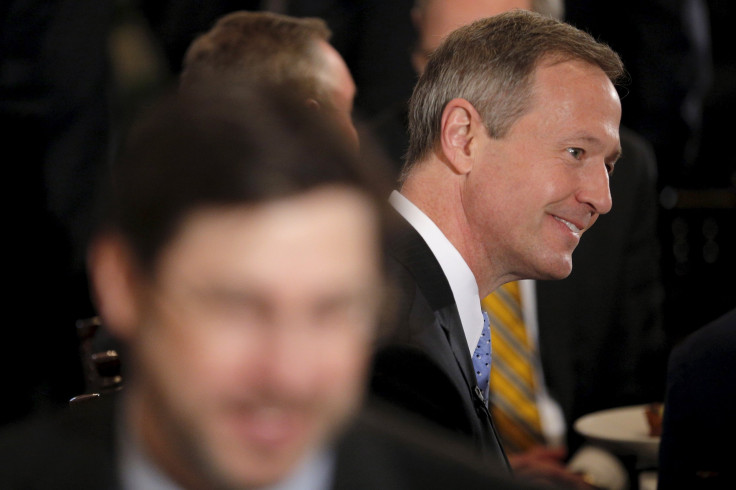Election 2016: Martin O'Malley's Immigration Reform Efforts Do Battle Against Hillary Clinton's

Jean-Yannick Diouf felt like his talents and life were being wasted because of his undocumented legal status. During his senior year at a Maryland high school in 2011, he watched and listened as his peers bragged about future college careers that he couldn’t afford because in-state tuition wasn’t available for undocumented immigrants. His mother brought him to the states from Senegal when he was eight.
The following year, Martin O’Malley changed Diouf’s life. The then-Maryland governor advocated for the recently-instituted Maryland Dream Act, which extended the once unattainable in-state tuition rates to undocumented immigrants, making Diouf’s attendance at the University of Maryland at College Park not only possible, but a reality.
Now, in the nascent stages of his long-shot presidential candidacy, O’Malley is seeking to use positive experiences shared by undocumented individuals in Maryland like Diouf to highlight his record on immigration, and some activist groups have been more than happy to oblige. But whether O’Malley can draw enough of a distinction between his and Democratic rival Hillary Clinton’s positions on immigration for it to make a difference and draw Latino voters remains to be seen.
“For us, really what matters here is an actual, tangible record that shows that Gov. O’Malley has been fighting for the Latino community,” said Cesar Vargas, an activist with the DREAM Action Network, a group that advocates for immigration reform. “It’s an overall consistent record of him standing up for the Latino community.”
O’Malley has been getting vocal support from people like Vargas, who are passionately focused on immigration reform and hoping the next president can get something done in that department. The former governor has repeatedly mentioned immigration reform, too, making it a point to bring up immigration in his presidential campaign announcement. He has been on Spanish-language television. He spoke to the Hispanic Chamber of Commerce. He hired President Barack Obama’s former media director, who is Hispanic. He has also vowed, if elected, to get something done on immigration in the first 100 days of his presidency.
But Clinton has taken steps to do much of the same. She hired a former undocumented immigrant to lead her Latino outreach effort. She went to Nevada and said she would further the Obama administration’s immigration executive action announced last year.
But for people like Vargas, O’Malley has a consistent background on immigration that Clinton lacks. For example, in 2008, Clinton was opposed to giving driver’s licenses to undocumented immigrants. These days, she is strongly in favor of them.
Vargas said other actions by Clinton were tone deaf, too. “It was children who was escaping death and violence,” he said, taking issue with a Clinton statement last year during the child migrant crisis when she said the children should be sent back to Central America. “When I heard that I said, ‘she said send them back, send me back.’”
But political scientists aren’t convinced O’Malley will be able to separate himself enough between Clinton’s stated policy positions to make much of a difference. While the two may have a different history, they’ve ended up in about the same place on immigration reform.
“Gov. O’Malley has a track record he can run on but, Secretary Clinton is not conceding any space there,” said Louis DeSipio, a professor of political science and Chicano/Latino studies at the University of California at Irvine. “She went to Nevada and said she will do more than President Obama has done [with his immigration executive action]. Whether she can do that or not is unclear, but it is an important message to send.”
Clinton has a history of doing well with the Latino community. In the 2008 presidential race, she won the Latino vote two-to-one, and in some bigger states, such as California, New Mexico and Texas, their votes played an important role.
“She knows how to run a Nevada campaign,” DeSipio said. Nevada, a state with a large Latino population and the first western primary, could be an important early nominating state and was one that Clinton won in 2008. Clinton is currently polling 50 points ahead of O’Malley.
According to exit polls from last year, Latino voters identified the economy as their top issue, followed by health care. Immigration was third, with 16 percent of respondents saying that issue was the most important to them.
“The problem, I think, is that campaigns and political operatives… sometimes make the mistake that all Latinos want to hear is immigration and immigration reform, and that is a mistake because over and over again when you poll Latinos on election day or close to election day, [their top issues are just like] everyone else’s issues,” said Maria Echaveste, a lecturer at the University of California at Berkeley. “It’s the economy. It’s healthcare. It’s education.”
In the end, the next president might not be able to do much to reform the immigration system through law, according to Karthic Ramakrishnan, a professor of public policy at the University of California at Riverside. O’Malley pointing to his immigration record is akin to pointing to something he has little chance of doing federally if he makes it to the White House.
“Chances are, given the way Congress is structured… it’s extremely unlikely that we’re going to get much movement on immigration reform until the next line of redistricting. So, after 2020,” Ramakrishnan said. “Things like what O’Malley has done, while commendable, [are] likely going to be confined to the states and not necessarily a road map to what he will pass at the national level. There’s limits to what they can do.”
© Copyright IBTimes 2024. All rights reserved.






















